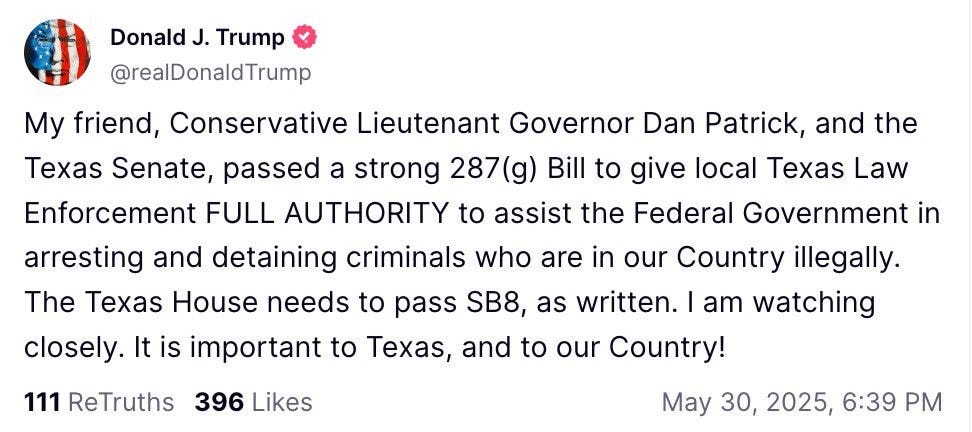Trump calls on Texas Legislature to Pass SB8 in support of the 287(g) program.
In a significant move to bolster immigration enforcement, Texas Senate Bill 8 (SB 8) of the 89th Legislative Session is poised to reshape the role of local sheriffs in federal immigration efforts. Passed by both chambers of the Texas Legislature, this bill mandates that sheriffs in populous counties partner with U.S. Immigration and Customs Enforcement (ICE) through the 287(g) program, intensifying the state’s approach to border security and deportation. Here’s a comprehensive look at SB 8, its provisions, and the debate surrounding it.
Overview of SB 8
Authored by Republican Senators Joan Huffman of Houston and Charles Schwertner of Georgetown, with 18 GOP co-sponsors, Texas SB 8, titled “Relating to agreements between sheriffs and the United States Immigration and Customs Enforcement to enforce federal immigration law,” requires sheriffs in counties with populations exceeding 100,000 to request and sign 287(g) agreements with ICE. These agreements, rooted in Section 287(g) of the Immigration and Nationality Act, empower trained local deputies to identify, process, and detain undocumented immigrants for federal action, typically in jails or during routine policing.
Key Provisions
• Mandate for Participation: Sheriffs in counties with over 100,000 residents must enter 287(g) agreements, enabling deputies to check immigration status in jails, issue detainers to hold individuals for up to 48 hours for ICE pickup, and serve administrative immigration warrants.
• Funding Support: The bill establishes a $20 million grant program to offset training, equipment, and other costs for sheriff’s offices in counties with fewer than 1 million residents participating in the program.
• Enforcement Mechanism: Noncompliant sheriffs face lawsuits from the Texas Attorney General’s Office, with legal action filed in the sheriff’s home county rather than Travis County, a shift aimed at local accountability.
• Scope: While focused on the jail model—screening inmates for immigration status—SB 8 aligns with broader efforts to expand the task force model, where deputies enforce immigration laws during everyday duties like traffic stops.
Context and Rationale
Texas, a frontline state in immigration debates, already has 72 law enforcement agencies—mostly sheriff’s offices—engaged in 287(g) agreements as of May 2025, with 20% using the task force model and four more applications pending. SB 8 builds on this, aligning with Governor Abbott’s border security push and President Trump’s Executive Order 14159, issued January 20, 2025, which called for maximum use of 287(g) to support mass deportation goals.
Supporters, including Lt. Gov. Dan Patrick, tout SB 8 as a public safety win. Tarrant County Sheriff Bill Waybourn testified in March 2025 that his jail, under the 287(g) jail model, holds over 300 undocumented individuals from 22 nationalities, some charged with serious crimes like murder and sexual offenses. “This is a force multiplier for ICE,” Waybourn said, noting the agency’s limited 6,000 officers nationwide can’t tackle the issue alone.
• Legislative Progress:
• Senate: Passed on April 1, 2025, with a 20-11 vote after rules were suspended and Democratic amendments failed.
• House: Approved on May 24, 2025, with votes of 89-50 (record vote RV#3476) and 86-47 (third reading, RV#3502), following amendments, including one by Rep. David Spiller requiring all sheriffs to participate in the warrant service model.
• Status: As of May 28, 2025, the Senate appointed conferees to resolve differences with the House version, indicating the bill is nearing final passage before heading to Governor Greg Abbott’s desk

